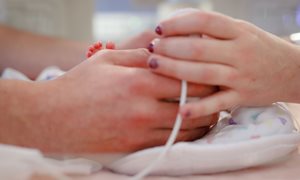
Large-scale research by Radboud university medical center among children who are born with a solitary functioning kidney shows that this has many long-term consequences. For example, 75% of the children have kidney damage at the age of 18 years. It also shows that obesity is an additional risk factor. The study shows the importance of follow-up in children with a solitary functioning kidney.
The vast majority of people are born with two working kidneys, but sometimes only one healthy kidney develops. The other is missing, or is not properly constructed. This is called a solitary functioning kidney. In the Netherlands, fifty to eighty children are born with a solitary functioning kidney every year. The kidneys each consist of a million tiny filters, which are only visible under a microscope. When a baby is born, the development of the kidneys is complete. The number of filters one is born with, will have to last a lifetime. Old age and, for example, being overweight, lead to wear and tear of these filters. And the fewer functioning filters, the harder the remaining ones have to work. So people born with one working kidney, only have half the number of filters. Those do work for two.
For a long time people assumed that having a solitary functioning kidney made no difference to a persons health. But past research by pediatric nephrologist Michiel Schreuder showed that damage to these kidneys is more common. In whom specifically, and to what extent, has now been investigated. The study shows that three-quarters of the children followed, at age 18 years, have some kind of kidney damage. The researchers also show that being overweight increases the risk of kidney damage. Professor of Pediatric Nephrology Michiel Schreuder: 'We can use these results in healthcare. We need follow-up of these children and monitor blood pressure, proteinuria and kidney function; our results support the need for this.'
Obesity is a risk factor
One risk factor the study shows is obesity. Kidney damage is more common in children who have a solitary functioning kidney and are overweight. That is why first author and PhD student Sander groen in 't Woud emphasizes the importance of a healthy weight: 'A healthy weight is very important for everyone, but for these children in particular. That's an extra reason to keep following these children.' Many of these children are seen for check-ups at Radboudumc Amalia Children's Hospital, which is one of the leaders in the field of research and care for children with congenital or rare kidney disease.
Follow-up research into causes of kidney damage
Over 900 children participated in this study, the SOFIA study using data from the AGORA data and biobank. Some of those children experience no effects, but it is not yet clear which factors contribute to any damage. That is what the researchers now want to find out further. 'We do not yet know exactly which mechanisms contribute to damage to the kidney. If we know the exact cause, we can look for more targeted medication, and thus better treatment, for these children,' Schreuder said. 'That also means that, in time, we may know which children we want to see for check-ups more or less frequently.'
About the publication
This article was published in Kidney International: Uncovering risk factors for kidney injury in children with a solitary functioning kidney - Sander Groen in 't Woud, Nel Roeleveld, Rik Westland, Kirsten Y. Renkema, Martijn G. Steffens, Valentina Gracchi, Marc R. Lilien, Joanna A.E. van Wijk, Wout F.J. Feitz, Michiel F. Schreuder, Loes F.M. van der Zanden, for the SOFIA study group. DOI: 10.1016/j.kint.2022.09.028.
-
Want to know more about these subjects? Click on the buttons below for more news.
More information
Pauline Dekhuijzen

wetenschaps- en persvoorlichter
Related news items

Greater understanding of heart surgery in pregnant women Research enables reduction of risks to unborn child
30 May 2022 A Radboudumc study, now published in European Heart Journal, has shown that it is better to postpone open-heart surgery in a pregnant woman until after delivery. go to page
Research sets standard for renal function of newborn babies Abnormal kidney function is now easier to detect
28 April 2022 Researchers at Radboudumc have succeeded in establishing reference values for functioning of the kidneys of newborn babies. This allows for earlier detection of kidney injury and for improved dosing of drugs handled by the kidneys. go to page
When one kidney does the work of two ... Radboud university medical center studies the causes and consequences of solitary functioning kidney
21 April 2022 The vast majority of people are born with two working kidneys, but sometimes only one healthy kidney develops. The other is missing, or is not properly constructed. Radboudumc studies how a solitary functioning kidney arises and what the consequences are for patients. go to page

